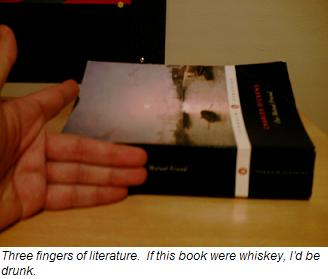Fish and Chips and Math
Today was the second and final day of discussion on Our Mutual Friend. There's no final exam in this class, just a paper on a topic of our choosing -- and as I won't be choosing something related to Our Mutual Friend, there's really no practical reason to have read it besides being able to talk about it in class. But more proud of having read it for no good reason than I would be if I'd needed to do a presentation on it or otherwise "use" it in class. I know I go on and on about it, but it went on and on, too, so I feel it's fair. As of now, I'm done with it (in this forum, anyway).
Afterwards, I caught the bus into town for some real food. "Real food" here means "something I didn't make that doesn't require the removal of plastic before it can be eaten." I ran into Charles on the way to the bus and made a pretty convincing show of taking his suggestion to get Indian food seriously, but we all know that I'm not going to go off and find some random Indian place by myself. What do I know? I need guidance. So I went off in search of fish and chips instead. I was still craving good fish and chips after being thwarted in my attempts on the pier and at the cricket match. I found a place called The House that was all patio and no restaurant: wherever the kitchen was, it wasn't anywhere I could see. There was some live music -- two guys on acoustic guitars -- which to me is normally a reason to avoid a place, but they were really laid back and suited the atmosphere well. Mostly Simon & Garfunkel, Eagles, and Don McLean.
Everyone who worked at the place seemed to be from somewhere else. The hostess was French, my waitress had an accent of some kind, another guy was... European -- and there was a French couple seated near me and a French woman with her (presumably) French toddler not far away. It's sad to see that the U.S. isn't the only country with an immigration problem. Of course, in England's case, not even chain-link fencing the beaches will help, what with that damn Chunnel just funneling more and more foreigners in every day. Tsk tsk.
When my bill came, I thought it looked about twice what it should've been, so I gave her a 20 note. When I only got 15p back (instead of nearly £10), I mentioned to her that my meal had't cost as much as I'd been charged, and she went back to the unseen kitchen to investigate. Five minutes later (I guess it's far away) she comes back and shows me the bill, and says she's sorry, but it's £19.85. The individual items on the bill, however, clearly total less than £10, but apparently she skipped that part. It looked to me like the three items had been added, totalled, and then added again to that total.
"I got fish and chips*, peas**, and a lemonade***," I told her. "How could those cost £19.85? There's no way they could. How is that possible?"
So off she went to check it again. I was starting to think this was either a joke or subversive European payback for America's foreign policy. A few minutes later, though, the French hostess came back with all the change I had coming to me and apologized for the error. She didn't argue the point at all. I appreciated that, of course, but boy, those French sure give up easy!
Oh, also. Right "outside" the seating area (we were all "outside," but this was only ten feet away or so) was a street "performer" (I'm big on the quotation marks tonight) dressed as a genie holding a brass lamp. He was dressed pretty much like Aladdin, but with face and body paint. He stood there stock still waiting for someone to drop a coin in his box for quite a while. I figured no one would, and was surprised when about half a dozen passers-by did. I don't get his act, though. He'd lean forward, beckon them closer, have them rub the lamp and close their eyes, and then tell them... something. I couldn't hear what, and I wasn't about to pay any amount of money to find out (my tip went to the musicians). Sometimes a group of young hooligans would come by and give him a hard time, as if he were a guard at Buckingham Palace. I've busked before, but I'd draw the line at dressing like a genie.
Anyway, to bed. More tomorrow.
*The fish and chips were good. Mission accomplished.
**When I ordered, the hostess asked me if I wanted peas with my chips. I felt game for that, even though I wouldn't have ordered a side of peas otherwise. It was a whole cereal bowl full of peas. I guess people are really into peas here. I mean, I ate them, but still. Peas?
***Sprite with a slice of lemon in it.



